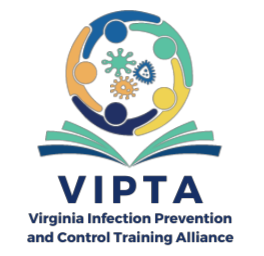
VIPTA is a statewide infection prevention and control education collaborative, led by the Virginia Healthcare-Associated Infections Advisory Group. Through partnership, VIPTA curates IPC resources for Virginia’s healthcare, congregate care, and public health settings.
❄️’Tis the Season…for Flu Prevention
Viral respiratory season is here, settling in right alongside the colder weather. National Influenza Vaccination Week (December 1–5) reminds us that there’s still time to get vaccinated and stay ahead of the flu. Especially with the holidays approaching fast, an annual flu vaccine for everyone six months and older is still the best way to keep flu from putting a damper on your winter season.
What to Expect
- National Foundation for Infectious Diseases (NFID) Flu Resources – ‘Wild to Mild’ flu campaign, posters, graphics, and videos
- VDH Respiratory Illnesses Resources – “Little Things” campaign, flyers, and social media graphics
How to Use It
- Make it visible. Print NFID “Wild to Mild” posters or VDH “Little Things” graphics for breakrooms, waiting rooms, or bulletin boards.
- Share it forward. Include links or images in your facility newsletter, onboarding packets, or weekly staff updates.
- Use data to drive action. Review local flu activity together and discuss how your facility can stay prepared as the season evolves.
Target Audience: Essential IPC Education Level
Guidance & Regulation Updates
VIPTA members track guidance and regulation resources to share source documents that guide infection prevention and control practices for public health staff and clinical and non-clinical healthcare personnel.
The date of the regulation or guidance update is included in each post. Please check linked content to be sure it is the most up to date and recommended practice.
ASHRAE: Ventilation of Healthcare Facilities (2/16/2026)
CDC: Updated 2026 National Healthcare Safety Network (NHSN) Surveillance Protocols (January 2026)
APIC: New White Paper on Centralized Health-Associated Infection Surveillance Programs and Micro-Credential to Advance Centralized HAI Surveillance and Patient Safety (1/20/2026)
VDH: Clinician Letter: Respiratory Illness and Measles Updates for Virginia (1/21/2026)
AHRQ: Toolkit for Improving Skin Care and MDRO Prevention in Long-Term Care Settings
Celebrating Sue Moeslein’s Dedication to Mentorship
Susan (Sue) Moeslein is not just a leader in infection prevention, she’s a mentor shaping the next generation of professionals. With over 40 years in healthcare and 17 years as an infection preventionist (IP), Sue has been a steadfast advocate for patient safety and quality of care. With a diverse background spanning various healthcare settings and roles including infection prevention and care management, Sue has brought her wealth of experience to Health Quality Innovators (HQI).
Sue is passionate about mentoring the next generation of IPs. As co-chair of the APIC-Virginia/VDH IP Mentorship Program, she has been instrumental in the program’s success. Recognizing the challenges faced by early-career IPs, Sue played a key role in developing this structured, low-burden mentorship program. By pairing experienced IPs with newcomers, the program fosters professional growth, enhances knowledge sharing, and standardizes best practices across the field. Sue’s dedication helped create a scalable model that supports both mentors and mentees while reducing the workload on seasoned professionals.
Thanks to her efforts, the mentorship program has seen high engagement, strong retention rates, and overwhelmingly positive feedback from participants. With structured learning modules, interactive discussions, and continuing education credits, mentees gain the skills and confidence needed to excel in infection prevention.
Sue’s passion for mentorship embodies the spirit of collaboration and leadership. Her work ensures that infection prevention professionals across Virginia are supported, empowered, and prepared for success.
Fun Facts About Sue
- Celebrating her 43rd wedding anniversary this year
- Has 3 grandchildren
- Registered nurse for 42 years
- In her spare time, she loves to quilt (and is very good at it)
IPC Education & Training Library
Search the VIPTA library of curated infection prevention and control (IPC) education and training resources. The IPC Education & Training Resource Library includes state and national resources related to healthcare-associated infections, antimicrobial resistance and/or IPC. Visit the VIPTA FAQ page to learn more about VIPTA library content.






